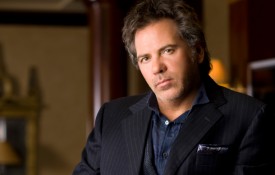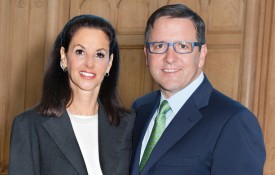“Men and women have more confidence in male portfolio managers than female,” Karen Finerman told me in a matter-of-fact manner when we spoke recently. I had consumed a number of articles and videos before I spoke with Finerman, the CEO and co-founder of Metropolitan Capital Advisors, a New York–based $400 million+ hedge fund, and was looking forward to her direct and non-apologetic style.
She is the author of “Finerman’s Rules: Secrets I’d Only Tell My Daughters About Business and Life” and a permanent panelist and chairwoman on CNBC’s “Fast Money.” She is the mother of two sets of twins and is happily married to Golub Capital President Lawrence Golub. She also serves on the Board of the Michael J. Fox Foundation for Parkinson’s Research.
Informing her that the lion’s share of CSQ’s demographic is successful, ambitious, pedal-to-the-metal males, I challenged her with the question, “Why should men care about women in business? What do and can women bring to business that men don’t and won’t?”
That reminded Finerman of a meeting with a hedge fund portfolio manager who told her that he only hired male analysts. When she asked him why, he said, “When a man comes in to pitch adding something to our portfolio, he pounds his fist on the table about all the money we can make. When a woman comes in, she talks about all the things that can go wrong. And I fall for the upside every time.”
“Women bring caution to the world of investing, which that world needs but doesn’t want,” she points out. “That caution causes both men and women to view women in finance as indecisive and not engendering confidence.” On the other hand, the humbleness of women may serve investors better than the hubris (i.e., reckless confidence) of men.
For women to succeed with investors, Finerman says, they need to take ownership of both the upside and the downside and take the risk of standing up for both. Women often lead with the downside because, she says, they tend to take ownership of the results.
“Don’t listen to your gut. Because your gut will often falsely extrapolate into the future so that you think what’s good will only get better, and what’s bad will only get worse. Instead do the opposite of what your gut is telling you.”
Shifting the focus to hedge funds, I decided to get an expert’s definition, as the concept is fuzzy to most people. “A hedge fund is a catch-all phrase for any kind of investment vehicle and runs the spectrum from risk aversion to pro risk,” explains Finerman. “They can be about plain vanilla instruments like government bonds to the most esoteric Nigerian debt. … Most of all,” she summarizes, “a hedge fund allows investors to participate in the business acumen of a particular manager or team. It allows them to do what they are capable of, and when you have a very smart one, they can do very well for you. With something like the Vanguard S&P Index, you don’t care who the manager is. With hedge funds, you’re betting on the jockey, not the horse.”
When assessing an opportunity, Finerman advises, “Don’t listen to your gut. Because your gut will often falsely extrapolate into the future so that you think what’s good will only get better, and what’s bad will only get worse. Instead do the opposite of what your gut is telling you.”
Coming from an extremely accomplished family (movie producer sister Wendy received an Oscar for Forrest Gump, and brother Mark is a real estate financier in Greenwich, CT), Finerman fesses to a natural competitiveness with her siblings. The greater influence, however, came from her late mother. She describes her as the “first Jewish Tiger Mom” who pushed her children to make their own money and be successful rather than to rely on anyone else to take care of them.
Finerman strives to maintain a life-work balance but admits she couldn’t do it without her husband, who she appreciatively calls the “project manager” of their family life. She agrees with the notion that everything in life competes for time, not for importance. In a life well lived, everything and everyone is important, and the key is to be totally present in whatever you’re doing and whomever you’re doing it with.
That’s the shrewdest investment of all.













































